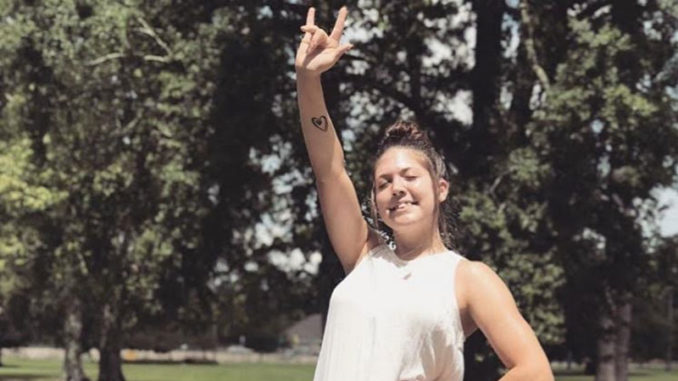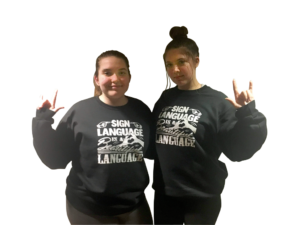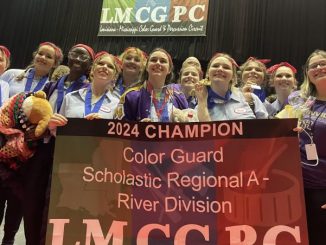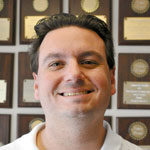
Miranda Matise doesn’t feel ashamed or even limited about her hearing loss, but the Destrehan High School alumnus remembers a time that wasn’t always the case.
Born prematurely along with her twin sister, the two had each endured numerous ear problems growing up and by the age of 13, Matise’s hearing had deteriorated to the point she needed a hearing aid. A hearing test revealed she was classified as hard of hearing, but the news didn’t faze her. Her sister had to have hearing aids by age seven, so as far as Matise was concerned, this wasn’t too far outside the norm.
“Honestly, when I first got my hearing aids, I was pretty excited,” said Matise, 18. “I felt like, ‘Awesome, I get to be like my sister now!’ So I was excited to tell my friends and they weren’t really into it. Some people really didn’t talk to me much afterwards. I started to get really self-conscious.”
After initially picking out bright colored hearing aids to stand out and show individuality, she soon found herself almost exclusively wearing her hair down to hide them, a phase that lasted over a year.
“It just became, ‘No one cares. I don’t like it. I don’t like this,’” Matise recalled. “I didn’t want anyone to know about it. I just wanted them to see me as me. So I dealt with it kind of hard.”
Her self-consciousness carried from middle school into high school. But during her junior year, she made acquaintance with another person who needed hearing aids, and who not only seemed to not let it affect him adversely, but who actually embraced it.
“Gavin didn’t hide it at all,” Matise said. “Seeing that really inspired me to do the same, and not only that, but to try to help other people who might have a disability realize it’s nothing to dwell on or have negative feelings over. You’re still you.”
Now a student at Southeastern Louisiana University, she’s making good on that. Matise and a classmate started the first American Sign Language club at Southeastern, and it has quickly taken a foothold: the newly formed club already has 18 members after just two meetings, and more have shown interest in joining. The club is called the Sound of Silence, and in addition to learning sign language, the group spreads awareness around campus about the disability.
That effort follows a senior project at Destrehan in which she raised money for Louisiana Hands and Voices, an organization that provides support for the families of children who are deaf or hard of hearing. She also made a special video to show what it means to be deaf or hard of hearing, with a focus on wiping out misconceptions about it.
[pullquote]“There’s a lot of stuff going on in this world, so why be negative, stay in your room and cry about it? Live your life and embrace positivity.” – Miranda Matise[/pullquote]“I know what (those who have suffered hearing loss) deal with … people tend to not understand it and may treat you differently, speak to you like you need to be fixed or even discriminate against them,” Matise said. “People ask me if I’m angry about being hard of hearing and I’m not at all.
“I’ve been asked whether deaf people can drive, and of course. It actually can make you more focused with your eyes. I’ve also been asked if my hearing aid is connected to my brain … or why don’t I just go and get cured. There are complications to having implants put in and for someone like me, who has moderate but not complete hearing loss, I’m not so far off to need that.”
But mostly, she takes issue with the idea that people who are dealing with these issues are somehow broken.
“That’s really what the video deals with. I hope to help people understand these people don’t need or want to be ‘fixed,’” she said.
The senior project fundraiser exceeded what she thought it would—“I wanted to initially raise $200, but it went all the way to $600, a lot of people shared the story … it was great to see” —and likewise, the Southeastern club has ballooned past her expectations.
“I just want others to know they don’t have to hide their disability,” she said. “There’s a lot of stuff going on in this world, so why be negative, stay in your room and cry about it? Live your life and embrace positivity.”
 Hearing loss
Hearing loss
- Approximately 1,000,000 people in the United States are considered functionally deaf, while approximately 35 million Americans (or 11.3 percent of the population) are hearing-impaired.
- The 2005 MarkeTrak VII report projected that the number of Americans with hearing loss will increase to 40 million by 2025 and 53 million by 2050.
- The No. 1 cause of hearing loss is excessive noise exposure.
- 37 percent of children with hearing loss fail at least one grade.





Be the first to comment